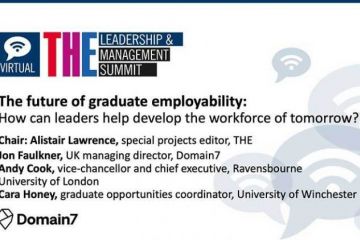More than three-quarters of UK university staff are dissatisfied with the way their institution is run, according to the preliminary results of a major survey that present damning feedback about the management of the country’s higher education sector.
Early data from the National Senior Management Survey, which is being developed by academics at eight universities, find that barely one in 10 (10.4 per cent) respondents is satisfied with the way their institution is managed; 76.5 per cent are not.
The survey has attracted more than 2,200 responses so far and the early findings have been released exclusively to Times Higher Education. Other significant results include:
- Only 15.9 per cent of respondents agreed that they felt respected and valued by senior management, and 71.6 per cent disagreed
- Three-quarters (74.1 per cent) said that their senior managers did not deserve the salaries they were paid
- Four out of five (79.6 per cent) said that they regularly worked at evenings or weekends to fulfil their academic roles
- More than half (55.6 per cent) said that pressure to meet publication targets such as those linked to the research excellence framework negatively affected their well-being
- More than two-thirds (69.5 per cent) said that their university did not give them enough time to be able to support their students’ needs.
The survey is being coordinated by Carl Walker, principal lecturer in psychology at the University of Brighton, and Paul Hanna, lecturer in sustainable tourism at the University of Surrey. Their aim, if they receive sufficient responses, is to create a league table of institutions in order to encourage good and discourage bad practice.
Dr Walker said that the survey “seeks to move the focus from the narrow metrics of staff performance to the senior management teams who set the conditions through which staff performance becomes possible”. He said that many university workers were clearly operating in “thin-ice territory”.
The survey highlighted the REF as a particularly damaging influence on UK higher education: only 10.8 per cent of respondents said that senior managers were sympathetic towards the competing pressures of the exercise and of student support. Only 31.3 per cent of respondents said that institutional leaders gave them the freedom to pursue a research agenda that they believed to be important; 42.3 per cent did not.
The National Student Survey also emerged as a potentially malignant force: only 9.9 per cent agreed that it was being used ethically to encourage the best performance of staff, and 66.7 per cent disagreed.
The qualitative data, which are still to be analysed, paint a more detailed picture. One respondent reported on a university that was “a systemically mean-spirited place”, where he or she felt “less a lecturer than a shoe-fitter, such is the overwhelming rush to make students customers. I am sick of the phrase ‘the student experience’. What about the staff experience?”
Another academic experienced “no real support to achieve a good work-life balance, just an increasing workload and a constant drip-feed of negative feedback that suggests we are lazy, incompetent and grasping”.
Despite staff concerns, latest data show that the average salaries of senior management continue to rise more quickly than those of rank-and-file staff. UK vice-chancellors' average pay rose by 6.1 per cent in 2014-15, while senior academics such as pro vice-chancellors and heads of school received 3.9 per cent.
Sir Cary Cooper, 50th anniversary professor of organisational psychology and health at the University of Manchester, argued that “we are asking people to do too much and have not created the right culture”. The single metric of the research excellence framework has “overwhelmed many universities, even the ones which used to be good at teaching”.
While Sir Cary suspected that one could find similar levels of dissatisfaction in other sectors, he believed that “to attract good people now requires well-being cultures and improving the quality of working life – universities are well behind on this”. Part of the problem was that human resources staff were often “poor” and “process-driven”, largely focused on “pay and rations” rather than “concerned about academics leaving and measuring well-being”.
For Sally Hunt, general secretary of the University and College Union, the results offered “an alarming insight into how badly supported and under pressure many university staff are”.
“It is very worrying that more than two-thirds of respondents did not believe they have adequate time for such fundamental elements of their teaching responsibilities as supporting students and providing good quality feedback to them,” Ms Hunt said. “Universities have turned the screws on their staff, and their excessive workloads mean too many feel they are short-changing their students.”
To complete the survey, which is open until the end of May, visit smsproject.wordpress.com.
Register to continue
Why register?
- Registration is free and only takes a moment
- Once registered, you can read 3 articles a month
- Sign up for our newsletter
Subscribe
Or subscribe for unlimited access to:
- Unlimited access to news, views, insights & reviews
- Digital editions
- Digital access to THE’s university and college rankings analysis
Already registered or a current subscriber?










